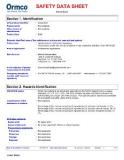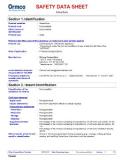Ormco Orthodontic Supply MSDS Sheets: A Comprehensive Overview.
Ormco, a leading provider of orthodontic supplies, ensures the safety of its products through detailed Material Safety Data Sheets (MSDS). These sheets provide essential information about the chemical composition, hazards, and safe handling procedures of each product.
Key Sections of Ormco MSDS Sheets:
- Identification:
- Product Name: The specific name of the orthodontic product.
- CAS Number: A unique numerical identifier for the chemical substance.
- Manufacturer: Ormco Corporation.
- Emergency Contact Information: Phone numbers for immediate assistance in case of an emergency.
Hazards Identification:
- GHS Classification: The product's classification according to the Globally Harmonized System (GHS) for hazard communication, including:
- Health Hazards: Potential health risks, such as irritation, toxicity, or allergies.
- Physical Hazards: Flammability, explosiveness, or reactivity. Environmental Hazards: Potential harm to the environment.
Label Elements: Information required on product labels, including hazard pictograms, signal words, and hazard statements.
Composition/Information on Ingredients:
- Ingredients: The chemical components of the product, listed in descending order of concentration.
- Concentration: The percentage of each ingredient.
- CAS Numbers: Unique identifiers for each ingredient.
First Aid Measures:
- Inhalation: Steps to take if the product is inhaled.
- Skin Contact: Procedures for handling skin contact.
- Eye Contact: Measures to follow if the product gets into the eyes.
- Ingestion: Instructions for if the product is swallowed.
Firefighting Measures:
- Extinguishing Media: Suitable extinguishing agents (e.g., water, foam, dry chemical).
- Special Hazards: Potential hazards during a fire, such as toxic fumes or explosive materials.
- Firefighting Equipment: Recommended protective equipment for firefighters.
Accidental Release Measures:
- Personal Precautions: Protective measures for personnel involved in cleanup.
- Environmental Precautions: Steps to prevent contamination of the environment.
- Methods for Cleanup: Procedures for safely cleaning up spills or leaks.
Handling and Storage:
- Precautions for Safe Handling: Guidelines for safe handling practices.
- Conditions for Safe Storage: Recommended storage conditions, including temperature, humidity, and compatibility with other materials.
Exposure Controls/Personal Protection:
- Exposure Limits: Permissible exposure limits (PELs) or occupational exposure limits (OELs).
- Personal Protective Equipment (PPE): Recommended PPE, such as gloves, eye protection, and respiratory protection.
Physical and Chemical Properties:
- Appearance: Physical state (e.g., solid, liquid, gas), color, odor.
- Odor Threshold: The lowest concentration detectable by smell.
- pH: Acidity or alkalinity of the product.
- Melting/Freezing Point: Temperature at which the product changes state.
- Boiling Point: Temperature at which the product boils.
- Flammability: Flammability characteristics.
- Reactivity: Chemical reactivity and stability.
Stability and Reactivity:
- Stability: Chemical stability under normal conditions.
- Conditions to Avoid: Factors that can cause instability or reactivity.
- Incompatible Materials: Substances that can react dangerously with the product.
- Hazardous Decomposition Products: Potential hazardous substances produced during decomposition.
** Toxicological Information:**
- Acute Toxicity: Short-term toxicity effects.
- Skin/Eye Irritation: Potential for skin or eye irritation.
- Skin Sensitization: Ability to cause allergic reactions.
- Respiratory Sensitization: Ability to cause respiratory allergies.
- Germ Cell Mutagenicity: Potential to damage genetic material.
- Carcinogenicity: Potential to cause cancer. Reproductive Toxicity: Potential to harm reproductive systems.
Ecological Information:
- Ecotoxicity: Toxicity to aquatic organisms.
- Persistence and Degradability: Persistence in the environment and biodegradability.
- Bioaccumulative Potential: Ability to accumulate in organisms.
- Mobility: Ability to move through the environment.
Disposal Considerations:
- Waste Disposal Methods: Recommended methods for disposing of the product.
- Packaging Disposal: Disposal of product packaging.
Transport Information:
- UN Number: United Nations number for transportation classification.
- Proper Shipping Name: Official name for transportation purposes.
- Hazard Class: Transportation hazard class.
- Packing Group: Packaging group indicating hazard level.
- Environmental Hazards: Environmental hazards during transportation.
- Regulatory Information: Relevant Regulations: Applicable regulations and standards.
- Other Information: Additional relevant information.
By providing this comprehensive information, Ormco's MSDS sheets help ensure the safe handling, storage, and use of their orthodontic supplies.
Filter
Document type
Product / 1
- Show all (116)
- (-) AdvanSync (2)
- Alias (8)
- Blugloo (4)
- Copper Niti (2)
- Damon (1)
- Damon 3 (2)
- Damon 3 MX (8)
- Damon Clear (8)
- Damon Clear 2 (8)
- Damon Q (7)
- Damon Q2 (4)
- Damon Ultima (1)
- Enlight (4)
- Enlight LV (2)
- Etching Gel (5)
- Gel Etchant (2)
- GrenGloo (6)
- Inspire ICE (2)
- OrthoSolo (6)
- Peerless Cast Buccal Tubes (2)
- Porcelain Primer (3)
- Snaplink (9)
- Spirit MB (1)
- Straightwire (3)
- Symetri (2)
- Symetri Clear (4)
- Titanium Orthos (2)
- VectorTAS (4)
- Washbon (4)

